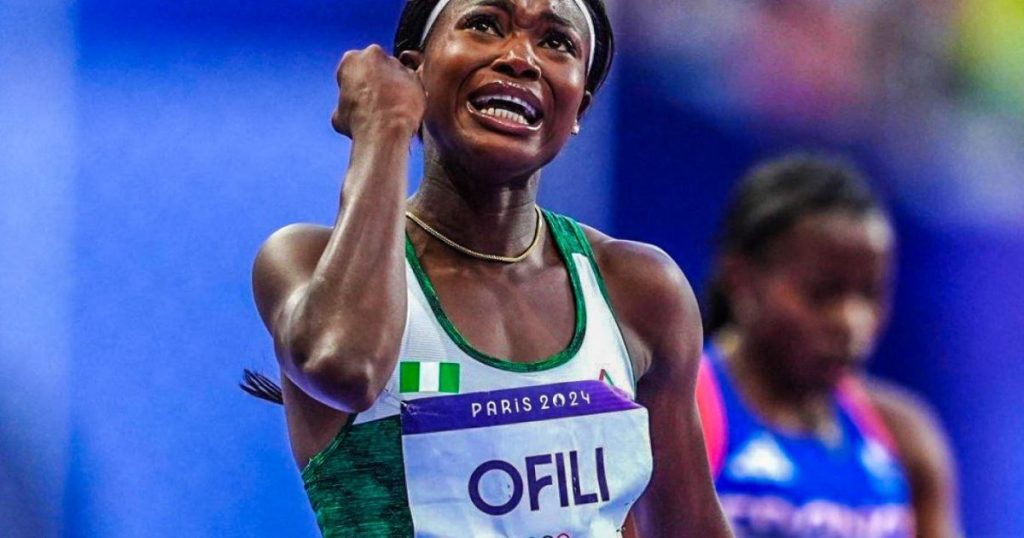The Nigerian athletics community is grappling with the news of Favour Ofili’s potential switch of allegiance to Turkey. Ofili, the women’s 150m world record holder, reportedly informed the Athletics Integrity Unit of her decision, citing frustrations with the Athletics Federation of Nigeria (AFN). Jamaican journalist Kayon Raynor broke the news, highlighting Ofili’s purported disappointment over missing the Tokyo 2020 Olympics and the AFN’s failure to register her for the 100m event at the Paris 2024 Games as key factors motivating her decision. Raynor emphasized that Ofili’s move was not driven by financial incentives. This development has sparked a wave of reactions from fans, athletes, and officials within the Nigerian sports landscape.
AFN president Tonobok Okowa, recently re-elected for a second term, expressed shock and disappointment at the news. While acknowledging Ofili’s right to make decisions about her career, Okowa lamented the potential loss of such a promising athlete. He apologized to Nigerians and the international sporting community for this “sad development,” suggesting a sense of responsibility for the situation. Okowa’s statement reveals a complex mix of emotions, ranging from sadness and disbelief to a begrudging acceptance of Ofili’s choice. This highlights the significant impact of athlete defections on national sporting federations, especially in countries like Nigeria with limited resources and a strong desire for international recognition.
Public opinion on Ofili’s potential move appears divided. Some fans expressed support for her decision, arguing that she deserves better treatment and opportunities than what Nigeria currently offers. Comments on social media platforms echoed this sentiment, with many encouraging other Nigerian athletes to follow suit. This demonstrates the growing frustration among some Nigerians with the perceived mismanagement and lack of support for athletes within the national sports system. Others, however, expressed disappointment and viewed Ofili’s potential departure as a loss for the country. This division reflects the complex emotional connection between athletes and their nation, where national pride and individual aspirations often intersect.
Adding another layer to the story, reports suggest that the Turkish athletics body has been actively recruiting foreign athletes, including Jamaicans, and offering substantial financial incentives for them to switch allegiances. This revelation raises questions about the role of financial inducements in international athlete transfers and the potential for wealthier nations to exploit the vulnerabilities of athletes from less developed countries. While Ofili’s move was reportedly not financially motivated, the Turkish federation’s alleged practices highlight the broader context of athlete migration and the potential influence of financial incentives in such decisions.
The AFN’s recent elections, which saw Okowa return for a second term, have also come under scrutiny in light of Ofili’s potential departure. Some critics argue that the current board should be replaced with sports professionals, suggesting that the existing leadership lacks the expertise and vision to effectively manage and support Nigerian athletes. This criticism highlights the ongoing debate about the role of politics and professionalism in sports administration and the need for effective leadership to nurture and retain athletic talent.
This isn’t the first time Nigeria has faced the prospect of losing talented athletes to other nations. Several high-profile athletes have previously switched allegiances, citing similar frustrations with the Nigerian sporting system. This recurring pattern underlines the systemic issues within Nigerian athletics and the urgent need for reforms to address the underlying problems driving athletes away. The list of departed athletes serves as a stark reminder of the potential consequences of neglecting athlete welfare and development, potentially leading to a drain of talent and diminished international competitiveness.
The case of Favour Ofili is a microcosm of the challenges facing Nigerian athletics. It highlights the need for improved athlete support, transparent governance, and a more professional approach to sports administration. The public reaction, ranging from support for Ofili’s decision to calls for systemic change within the AFN, underscores the urgency of addressing these issues to ensure the future success of Nigerian athletics and prevent further loss of talent. This incident serves as a wake-up call for the Nigerian sporting authorities to prioritize athlete welfare and create a more conducive environment for them to thrive and represent their nation with pride.


